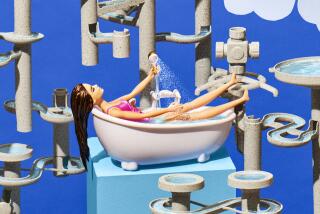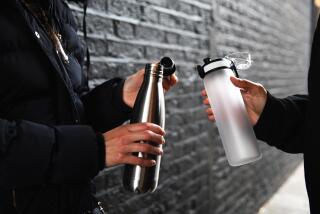Water Down Your Diet
- Share via
It’s our body’s vital fuel, a health drink from Mother Nature. It’s calorie-free, cheap (sometimes even free) and easily obtained.
Yet, few people follow the old-fashioned but, some say, still legitimate advice to drink eight glasses of water a day, says Dr. Stephen Brunton, director of family medicine at the Long Beach Memorial Medical Center.
“People drink when they are thirsty,” Brunton says, “but the beverage of choice tends not to be water.”
Abby Ershow, a nutritionist at the National Heart, Lung and Blood Institute, argues that most of us take in plenty of water--either straight from the glass or from foods like fruits and vegetables--unconsciously. Most people don’t need to boost water intake, she says.
Liquid Stats
* Americans drink two or three glasses of plain water a day according to a U.S. Department of Agriculture survey conducted in the late 1970s (and believed to be the most recent), says Ershow, who was involved in the survey.
When she analyzed all fluid intake, though, she found the average intake for adults is about two quarts a day, including water from foods and from other beverages. “It’s not usually necessary to swallow two quarts of plain water a day,” says Ershow, emphasizing that people with special problems such as kidney conditions might be exceptions.
* Per capita, Americans drink eight gallons of bottled water a year--roughly two ounces or a quarter-cup a day--according to the International Bottled Water Assn.
* Californians can be proud: They drink three times the national average of bottled water, downing 24 gallons a year, or nearly a cup a day.
* Americans average two cans of soft drinks a day, according to the National Soft Drink Assn.
* Coffee drinkers sip 3.4 cups a day, says a spokeswoman for the Specialty Coffee Assn., of America, citing a 1991 study by the National Coffee Assn. of the U.S.A.
The Wonders of Water
Boosting intake of plain water makes good sense, many experts concur, because:
* Water eases digestion and regulates body temperature.
* Water bathes the cells and accounts for about 60% of body weight.
* Water can help us exercise longer and more efficiently.
* Drinking water can ward off constipation and maybe even crankiness.
* Since it’s a natural appetite suppressant, water can help us lose weight and keep it off.
* Water can help keep skin healthy, although it won’t necessarily banish acne.
Who Should Drink?
We all should, but pregnant women, nursing mothers and athletes should be especially careful to drink enough water.
The Weather Factor
When it’s hot or humid, upping water intake is wise.
Water With Exercise
“Water reduces body temperature so it’s safe for you to exercise,” says Ellen Coleman, a clinical dietitian at Riverside Community Hospital and an exercise physiologist.
“Drinking fluids, particularly water, during exercise reduces cardiovascular stress and improves performance,” Coleman says. “After a workout you have to replace the fluids you have lost. Otherwise, you will suffer chronic dehydration.”
Her advice: Drink water before, during and after exercise.
The Infection Factor
Among physicians, urologists are probably most likely to extol the virtues of water.
“Water helps prevent urinary tract infections, both for men and for women,” says Dr. Arthur Schapiro, staff urologist at Santa Monica Hospital Medical Center and a UCLA associate clinical professor of urology.
Water can be especially helpful, he says, for people with a history of kidney stones because it dissolves calcium in the urine, reducing the risk of stone formation.
Day Versus Night Drinking
Drinking water mostly before 5 p.m. can reduce the likelihood of nocturnal bathroom visits.
No Time to Count?
Too busy to count how many glasses a day you drink? There are other ways to calculate if your intake is sufficient.
Dark-colored urine often suggests you are not drinking enough water, Brunton says.
Getting Into the Habit
Start by drinking a glass with every meal, then work in a cup between meals.
Certain workers seem to have a more difficult time developing the water-drinking habit. Among those who don’t drink enough: teachers, airline attendants and nurses.
Getting Into the Habit II
If you can spare the time and expense, you might check into a spa to learn the water-drinking habit.
When guests arrive at The Oaks at Ojai or The Palms at Palm Springs, they get a plastic water bottle and are encouraged to tote it along on hikes and exercise classes and to fill it up often, says owner Sheila Cluff. At mealtime, the spa cuisine is always accompanied by ice water with a lemon twist.
More to Read
Eat your way across L.A.
Get our weekly Tasting Notes newsletter for reviews, news and more.
You may occasionally receive promotional content from the Los Angeles Times.






